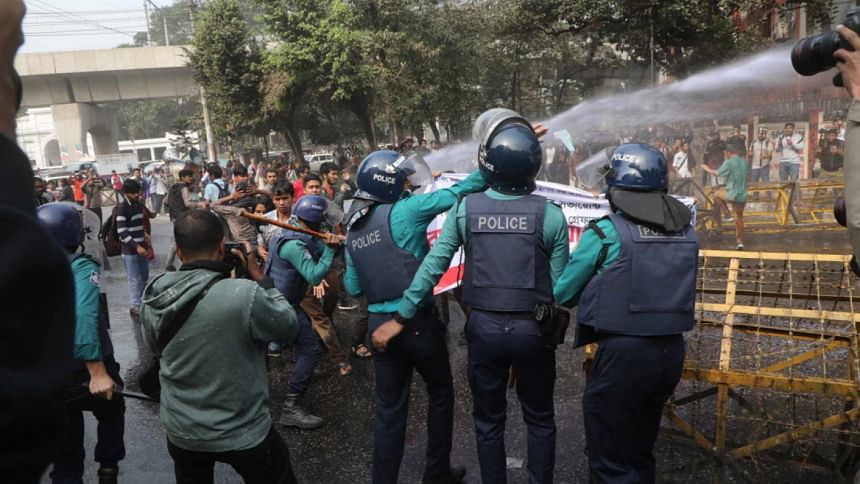Police brutality on protesters: A betrayal of the July uprising

The July 2024 uprising was meant to ignite hope and bring meaningful changes to Bangladesh. It was a movement led by students, workers, professionals, and activists -- united not by political ideologies but by a common vision for justice, democracy, and fairness. They risked everything for a better future, a better Bangladesh.
But now, it seems that the government born from this uprising has started to betray the very ideals it was supposed to uphold and is becoming just like its predecessor the people had fought against.
On January 15, 2025, an indigenous group, along with supporters, peacefully protested in Dhaka against the removal of the word "indigenous" (adivasi in Bangla) from textbooks. This deletion of their identity deeply hurt their community. Instead of being heard, they were attacked by a group pretending to defend the country's "sovereignty". At least 20 protesters, including women, were injured, while the police stood by, doing nothing. The new government failed to protect its citizens.
That night, government officials claimed they had detained two people involved in the attack of indigenous protesters. They condemned the attack, promising justice.
However, the next day, when people marched again to demand justice for the attack, the government's response was rather harsh. This time, they used law enforcers, who turned to violence during a peaceful protest. The same police officers who had stood idle and watched indigenous people get beaten up with stumps and sticks (some bearing the national flag) now turned on the students, using water cannons, teargas, and sound grenades to silence their voices. They also charged batons pushing women to the ground, leaving six people injured.
These actions are no different from the brutal repression that people had hoped to end through the July uprising. We know all too well that it was this kind of law enforcement -- violent and brutal -- that escalated the July uprising.
But that was only the latest instance of betrayal. Many of those injured during the July uprising in 2024 still haven't received proper medical care. Those who sacrificed so much, have been forced to protest on the streets for basic treatment. Their suffering is a stark reminder of how this government has failed to honour the people who fought for change.
The promises of reform and accountability made during the uprising now seem hollow.
This government, born from a struggle for justice and democracy, has become everything it promised not to be -- oppressive, violent, and disconnected from the people. It is failing to protect its citizens, control rising costs, or deliver on its promises of change.
This government cannot afford to betray its people whose wounds are still fresh. Bangladesh deserves a leadership that listens to its people, protects their rights, and values their sacrifices.

 For all latest news, follow The Daily Star's Google News channel.
For all latest news, follow The Daily Star's Google News channel. 







Comments